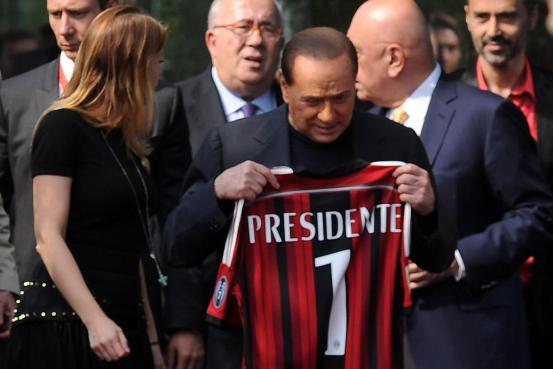- Commissioner’s statement on Ventura, Marte
- Ronnie O’Sullivan: Masters champion ‘felt so vulnerable’ in final
- Arron Fletcher Wins 2017 WSOP International Circuit Marrakech Main Event ($140,224)
- Smith challenges Warner to go big in India
- Moncada No. 1 on MLB Pipeline’s Top 10 2B Prospects list
- Braves land 2 on MLB Pipeline’s Top 10 2B Prospects list
- Kingery makes MLB Pipeline’s Top 10 2B Prospects list
- New Zealand wrap up 2-0 after Bangladesh implosion
- Mathews, Pradeep, Gunathilaka to return to Sri Lanka
- Elliott hopes for rain for Poli
Breaking Down the Vital Information of AC Milan’s Potential China Sale
- Updated: April 29, 2016

Of the innumerable dramas surrounding AC Milan over the last year, none has had more twists and turns—or been more important to the future of the club—than Silvio Berlusconi’s quest for a cash infusion.
Berlusconi finally gave in last year and began to seek investment from outside his Fininvest holding company. It had been long needed.
Berlusconi’s daughter, Marina, chairman of Fininvest, cut Milan off financially in 2010, slashing her father’s intended transfer budget by half. The Rossoneri won the Scudetto the next season, but soon began a cycle of selling their top players like Zlatan Ibrahimovic and Thiago Silva and replacing them with cut-rate players.
In August 2015, Berlusconi reached a deal with Thai businessman Bee Taechaubol for a 48 percent stake in the club, with Mr. Bee, as he is known, pumping €480 million into Milan’s accounts.
However, the deal has been beset with delays, and now it seems like Berlusconi has moved on—and the new investors are much more likely to complete things than Taechaubol was.
Two weeks ago, La Gazzetta dello Sport reported (h/t Football Italia) Taechaubol had been overtaken by a new group of investors from China. Within a day of that report, both Bloomberg and Sky claimed (h/t Football Italia) that negotiations were in an advanced stage.
There are some major differences between this bid and the Taechaubol deal that must now be considered failed.
The first—and perhaps most important—is the nature of the parties. Mr. Bee is a broker. He’s not independently wealthy. Forbes’ Mike Ozanian reported last year that his businesses had a yearly revenue of about $100 million. In 2013, he told The Worldfolio: “It isn’t like I have THB10 billion (according to X-Rates.com slightly less than $286 million) of cash lying around, but I know where to get it.”
This was …
continue reading in source www.bleacherreport.com
